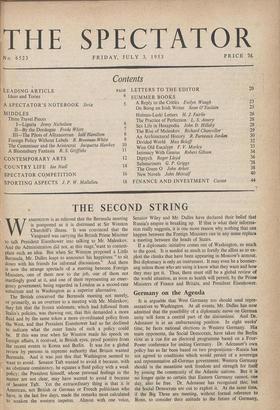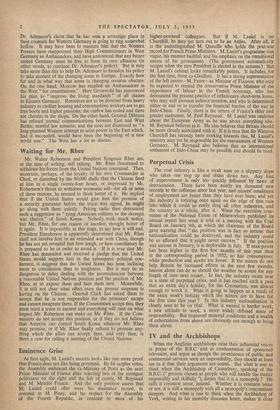Germany on the Agenda
It is arguable that West Germany too should send repre- sentatives to Washington. At all events, Mr. Dulles has now admitted that the possibility of a diplomatic move on German unity will form a central part of the discussions. And Dr. Adenauer is in an embarrassing position. In eight weeks' time, he faces national elections in Western Germany. His main opponents, the Social Democrats, have taken the Berlin riots as a cue for an electoral programme based on a Four- Power conference for uniting Germany. Dr. Adenauer's own policy has so far been based on two propositions—Russia has not agreed to conditions which would permit of a sovereign and representative all-German government; Western Germany should in the meantime seek freedom and strength for itself by joining the community of the Atlantic nations. But it is no longer quite so certain that Eastern Germany cannot, one day, also be free. Dr. Adenauer has recognised this; but the Social Democrats are out to exploit it. At the same time, if the Big Three are meeting, without formal reference to Bonn, to consider their attitude to the future of Germany, Dr. Adenauer's claim that he has won a sovereign place in their counsels for Western Germany is going to ring somewhat hollow. It may have been to reassure him that the Western Powers have reappointed their High Commissioners in West GerMany as Ambassadors, and have announced that any future united Germany must be free to form its own alliances (in other words, to continue Dr. Adenauer's policy). But it may take more than this to help Dr. Adenauer to broaden his policy to take account of the changing scene in Europe. Exactly how far and in what way that scene is changing remains obscure. On the one hand, Moscow has recalled its Ambassadors in the West " for consultations." Herr Grotewohl has announced his plan‘ to " improve the living standards " of all classes in Eastern Germany. Resources are to be diverted from heavy industry to civilian housing and consumption; workers are to get free boots and higher pensions; the curfew has ended and there are cherries in the shops. On the other hand, General Dibrova has refused normal communications between East and West Berlin; martial law remains; and the riots are dismissed as " a long-planned Western attempt to seize power in the East which, had it succeeded, would have been the beginning of a new world war.". The West has a lot to discuss.



























































 Previous page
Previous page